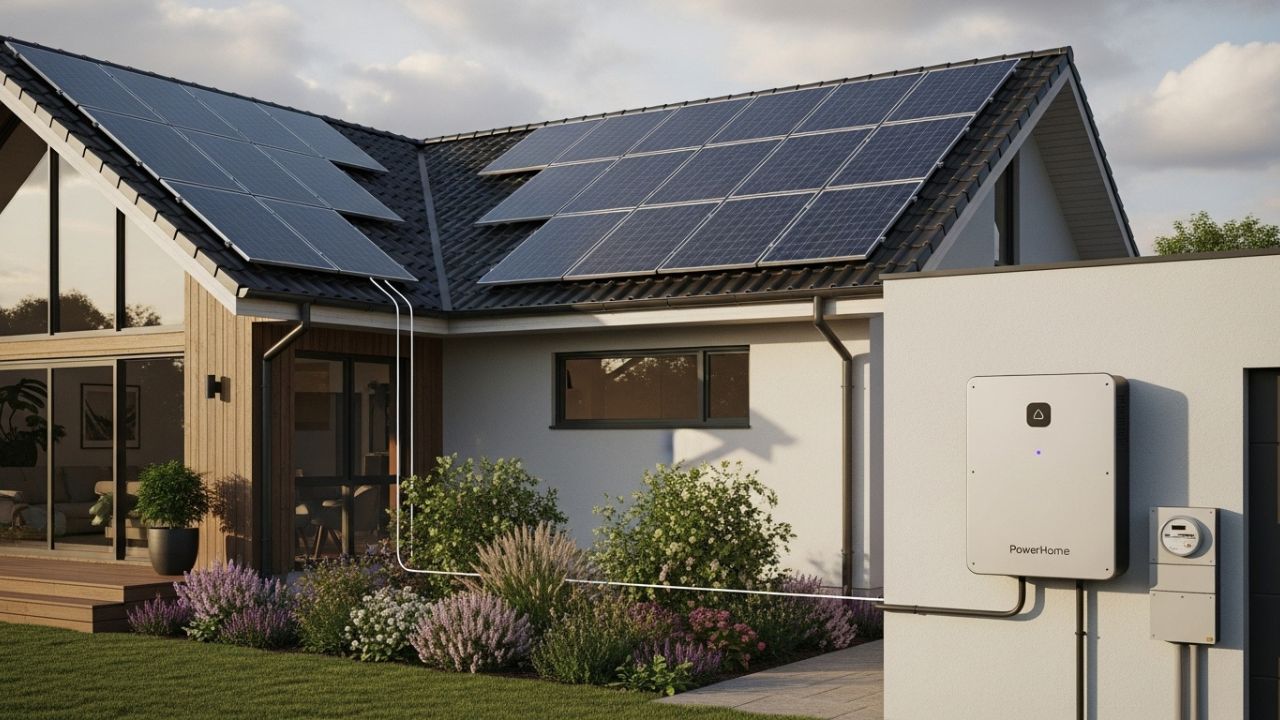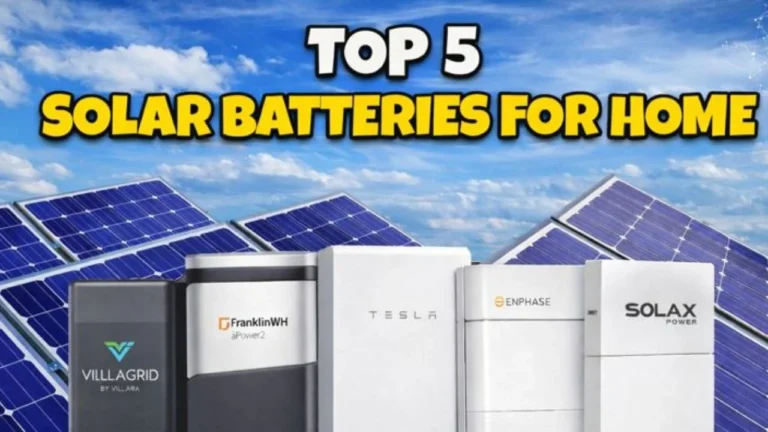Home Battery Storage & Solar Systems: Tamil Nadu has emerged as one of India’s most solar-friendly states, known for both policy support and exceptional sunlight resources. By combining home battery storage with rooftop solar setups, residents are achieving complete energy independence—reducing bills, balancing power during outages, and contributing to a greener environment.
However, for many new adopters, a key question remains: How much does a home solar with battery system cost per kW in Tamil Nadu, and is it worth it?
This guide provides a comprehensive cost breakdown, subsidy details, and expert-backed insights to help homeowners make the most intelligent, cost-effective energy choice.
Solar System Costs per kW in Tamil Nadu (2025)
Price Overview
As of late 2025, solar panel installation prices in Tamil Nadu range between ₹65,000 and ₹85,000 per kW for grid-tied setups. Larger projects tend to have better per-kilowatt value due to bulk component efficiencies.
| System Size | Approx. Cost (₹) | Subsidy (₹) | After Subsidy Cost (₹) |
| 1 kW | 65,000 – 75,000 | 30,000 | 35,000 – 45,000 |
| 2 kW | 1,30,000 – 1,50,000 | 60,000 | 70,000 – 90,000 |
| 3 kW | 1,95,000 – 2,25,000 | 78,000 | 1,17,000 – 1,47,000 |
| 5 kW | 3,25,000 – 3,75,000 | 78,000 | 2,47,000 – 2,97,000 |
| 10 kW | 6,50,000 – 7,50,000 | 78,000 | 5,72,000 – 6,72,000 |
These figures include standard-grade inverters and aluminum structures but exclude battery costs. High-efficiency modules like Mono PERC or TOPCon can increase total cost yet deliver higher energy yield and faster payback.
Key Influences on Price
- Panel efficiency: Premium TOPCon modules cost ~10–15% more.
- Inverter type: Hybrid inverters support batteries and cost extra.
- Mounting structure: GI and aluminum frames raise installation costs but last longer.
- Installation complexity: Urban rooftops with limited area or tilt angle require additional design expenses.
Battery Storage Costs per kWh in Tamil Nadu
Tamil Nadu’s growing focus on hybrid solar battery systems reflects a larger national movement toward storage-integrated power. Here’s a detailed view of home-based battery costs:
| Battery Type | Average Cost (₹/kWh) | Lifespan | Maintenance |
| Lithium-Ion | 25,000 – 35,000 | 8–12 years | Minimal |
| Lead-Acid | 15,000 – 22,000 | 4–6 years | Moderate |
For a 5 kW hybrid solar setup, a 5–10 kWh lithium-ion battery pack usually costs ₹1.25–₹3.5 lakh, depending on brand and capacity. A cost-effective lead-acid alternative can lower initial setup expenses but requires frequent water top-ups and earlier replacements.
Read Also: Commercial Rooftop Solar System Payback in India 2025: A Complete Guide for Businesses
Combined Solar Plus Battery System: Total Cost Breakdown
Installing an integrated hybrid solar battery system, including panels, inverter, and storage, costs more initially but ensures 24/7 power independence.
| System Type | Size | Approx. Total (₹) | Subsidy | Post-Subsidy Cost (₹) |
| Hybrid Solar (Lithium-Ion) | 2 kW | 1,60,000 – 2,20,000 | 60,000 | 1,00,000 – 1,60,000 |
| Hybrid Solar (Lithium-Ion) | 5 kW | 3,80,000 – 4,80,000 | 78,000 | 3,02,000 – 4,02,000 |
| Hybrid Solar (Lead Acid) | 5 kW | 3,00,000 – 4,00,000 | 78,000 | 2,22,000 – 3,22,000 |
The price difference arises from inverter type, battery chemistry, and efficiency ratings.
Subsidy and Government Support (2025 Update)
PM Surya Ghar Muft Bijli Yojana 2025
The central program offers these rooftop subsidies for Tamil Nadu residents:
- ₹30,000 for 1 kW
- ₹60,000 for 2 kW
- ₹78,000 for 3 kW and above (maximum cap)
The subsidy is credited directly to the applicant’s bank account after net meter installation and system inspection through the National Rooftop Solar Portal.
Tamil Nadu currently doesn’t offer state-level subsidies for residential setups, but agriculture and institutional users benefit through KUSUM and BESS pilot projects.
Latest Trends in Tamil Nadu’s Solar-Battery Sector
Tamil Nadu took a major step forward in 2025 by launching its first large-scale solar-plus-battery projects in Karur and Tiruvarur.
Each plant combines 15 MW solar capacity and 45 MWh battery storage, developed under a 25-year plan at a projected cost of ₹200 crore. These projects will act as pilots for round-the-clock renewable energy, offering lessons for residential adoption of similar hybrid models.
The levelized tariff of ₹6.49 per unit demonstrates the state’s growing competitiveness against grid exchange prices that often rise to ₹10 a unit during peak demand.
Advantages of Home Solar + Battery Storage
- Round-the-clock power: Store daytime solar energy for nighttime usage or power outages.
- Electricity bill savings: Cut down yearly energy costs by ₹25,000–₹60,000 depending on usage.
- Eco-friendly benefits: A standard 5 kW system offsets about 250 tons of CO₂ over 25 years.
- Property appreciation: Solar-ready homes fetch higher property valuations.
- Grid independence: Strategic backup keeps essential systems (lights, fans, internet) operational during outages.
Example Estimations
Case Example 1: 3 kW Hybrid Setup
- Solar system cost: ₹1,95,000 – ₹2,25,000
- Subsidy: ₹78,000
- Battery (5 kWh lithium-ion): ₹1,30,000
- Total: ₹2,47,000 – ₹2,77,000 (post-subsidy)
Expected Savings: ₹28,000 annually
Payback: 6 years.
Case Example 2: 5 kW Setup with 10 kWh Battery
- Gross Cost: ₹4,80,000 – ₹6,00,000
- Subsidy: ₹78,000
- Net Cost: ₹4,02,000 – ₹5,22,000
- Annual Saving: ~₹35,000 – ₹50,000
- Break-even: 5–7 years.
Steps to Avail Subsidy
- Visit the National Rooftop Solar Portal (https://solarrooftop.gov.in).
- Fill in your location and property details.
- Select an MNRE-approved installer in Tamil Nadu.
- Upload required documents and installation images.
- Wait for TANGEDCO inspection and net-meter approval.
- Subsidy credited after validation.
Approved vendors usually guide clients through this process efficiently.
Frequently Asked Questions (FAQs)
1. Is battery storage mandatory?
No. But it’s recommended for backup and maximized self-consumption during blackouts.
2. Are hybrid systems eligible for subsidy?
Yes. Subsidy applies to total solar setup cost, including inverter and battery components (for hybrid types).
3. What’s the average lifespan of lithium-ion batteries?
8–12 years, depending on brand and daily charge cycles.
4. Can industries benefit from storage systems?
Yes. Beyond savings, industries gain accelerated depreciation benefits and improved load management.
5. Does Tamil Nadu have future plans for battery integration?
Yes. TNERC has approved 1000 MWh BESS projects at substations to enhance grid stability.
Conclusion
Tamil Nadu is entering a new phase of renewable energy self-reliance through solar-plus-battery technology. The average solar cost per kW is ₹65,000–₹85,000 and battery storage adds ₹25,000–₹35,000 per kWh for lithium-ion systems—figures that are steadily dropping as technology matures.
For homeowners, the combination unlocks unmatched energy savings, protection from grid volatility, and environmental sustainability. With government subsidies and new hybrid models emerging across the state, this is the right moment to invest in solar battery systems and secure free, clean power for decades ahead.





14 thoughts on “Home Battery Storage & Solar System: Cost per kW in Tamil Nadu”